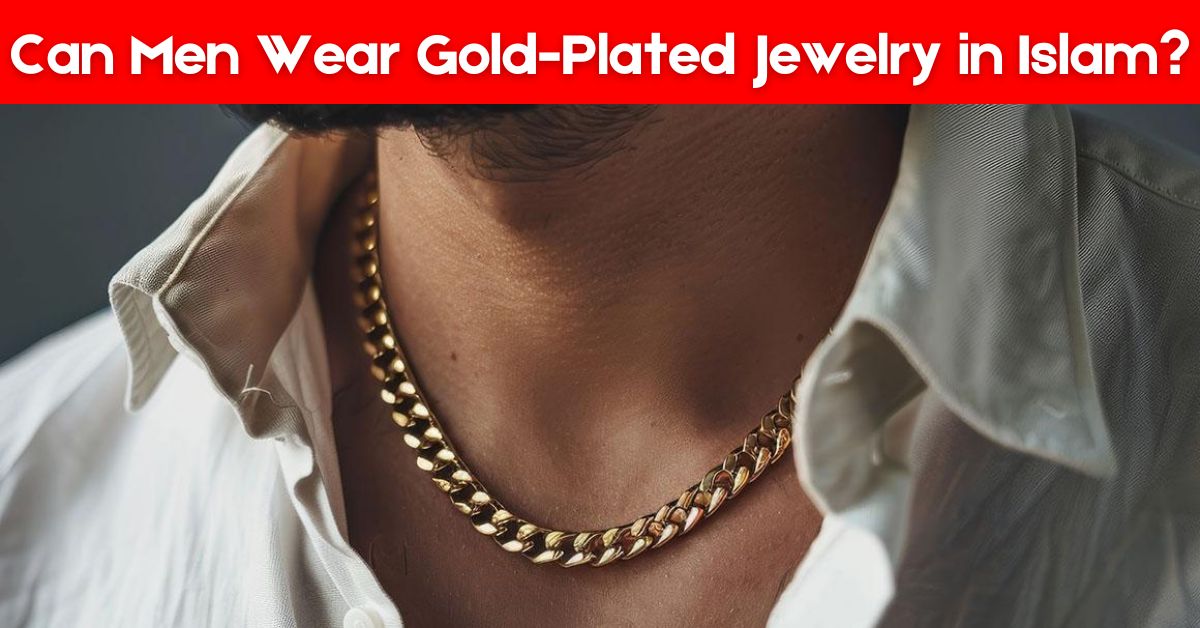Can Men Wear Gold-Plated Jewelry in Islam? Islamic Rulings for Men’s Accessories

Muslim men are unequivocally prohibited from wearing pure gold based on the Prophet ﷺ’s hadith, such as: ‘What is that in your hand? It is like holding a burning coal’ (Sunan Muslim 44:48). But when it comes to the question, Can Men Wear Gold-Plated Jewelry in Islam?, the answer is more nuanced, depending on whether the gold layer is extractable or purely decorative.
The majority of scholars—especially within the Ḥanbalī school—consider any extractable gold on men’s items forbidden (IslamQA: Ruling on Men Wearing Jewellery Plated with 18K Gold).
Others permit pieces whose plating cannot be removed and serves merely as a color finish. Across the four madhhabs, the Shāfiʿī and Ḥanbalī explicitly forbid all gold‑plated items for men, the Mālikī discourage even trace amounts, while the Ḥanafī allow minimal, inseparable gold under strict conditions.
For those seeking halal alternatives, silver, platinum, diamonds, stainless steel, and titanium offer stylish yet compliant options.
Introduction to Can Men Wear Gold-Plated Jewelry in Islam
Gold‑plated accessories—rings, watches, chains—offer the luster of gold at an affordable price point. For Muslim men, the question arises: do these items count as “real gold” under Islamic law, or are they permissible when the gold layer is purely decorative? We explore the relevant hadiths, classical and contemporary fatwās, and practical guidance for today’s Muslim man.
The Islamic View on Men Wearing Gold
What Does Islam Say About Men Wearing Gold?
The Prophet ﷺ forbade gold unequivocally for men. In a well‑known narration, he observed a man wearing a gold ring, removed it, and said, “Would any of you take a burning coal and hold it in his hand?” (Sahih Muslim 44:48). He further declared: “Silk and gold are permitted for the women of my ummah and forbidden for the men” (Abū Dāwūd 4057; An‑Nasā’ī 5144; Ibn Mājah 3595).
Why is Gold Forbidden for Men in Islam?
Scholars explain that gold represents luxury and femininity; its prohibition for men reinforces modesty and clear gender distinctions. As stated in the hadith, these rulings aim to prevent imitation and social corruption by maintaining distinct adornment norms for men and women.
What Is Gold‑Plated Jewelry?
Definition and Types of Gold‑Plating
Gold plating is the process of depositing a thin layer of gold onto a base metal via electroplating or chemical methods (Wikipedia: Gold Plating). In jewelry, thickness categories include:
- Gold flashed/washed: < 0.5 µm
- Gold plated: ≥ 0.5 µm
- Vermeil (heavy plated): ≥ 2.5 µm
Does Gold‑Plated Count as Gold in Islam?
Islamic scholars hold differing views on whether gold-plated items fall under the same ruling as pure gold, especially when asking: Can men wear gold-plated jewelry in Islam?
If the Gold is Extractable or Visible
If the gold layer on an item can be peeled, scratched off, or extracted, then most classical and contemporary scholars consider it to hold the same ruling as pure gold—and thus, it is forbidden (haram) for Muslim men to wear. Additionally, some scholars argue that even if an item is not made of pure gold, but strongly resembles it in color, shine, and appearance, it should be avoided to uphold the spirit of the prohibition in Islam.
If the Gold Layer is Non-Extractable or Microscopic
On the other hand, if the gold plating is microscopically thin and cannot be extracted or separated from the base metal, some scholars permit it. This is especially relevant for items like gold-toned watches, rings, or cufflinks that contain no significant gold content and are purely decorative in nature.
Islam encourages avoiding doubtful matters (shubuhāt). If there is uncertainty about whether the jewelry falls under the prohibition, it’s safer to opt for clearly halal options.
Can Men Wear Gold-Plated Jewelry in Islam According to Scholars
- Shāfiʿī: Prohibits any gold content, regardless of thickness.
- Mālikī: Considers trace gold makrūh (disliked) and advises avoidance.
- Ḥanafī: Permits minimal, inseparable gold if it cannot be removed and is vastly inferior to the base metal.
- Ḥanbalī: Forbids all gold‑plated materials, aligning with the principle of avoiding imitation.
Fatwas and Modern Rulings
Contemporary councils echo these classical views. The Permanent Committee for Scholarly Research and Iftā̒ states: “If the watch or its band is made of gold, it is not permissible for men. If it is not gold, it is permissible.”
Halal Alternatives to Gold-Plated Jewelry for Muslim Men
Permissible Metals and Styles
- Silver: Endorsed by the Prophet ﷺ himself when he wore a silver ring.
- Platinum & Diamonds: Luxurious yet halal.
- Stainless Steel, Titanium, Leather: Modern, masculine, and fully permissible.
Tips for Choosing Islamic‑Compliant Accessories
- Verify Hallmarks: Ensure no real gold content.
- Avoid Gender Imitation: Choose designs distinct from women’s jewelry.
- Steer Clear of Doubt: When in doubt (shubha), opt for clearly permissible materials.
FAQs About Can Men Wear Gold-Plated Jewelry in Islam
- Is a gold‑plated watch haram?
Only if its gold layer is extractable; non‑removable color finishes are generally allowed. - What if the plating is microscopic?
Jurists focus on extractability, not mere appearance—very thin, non‑extractable layers are typically permissible. - Are gold‑tone (non‑gold) items allowed?
Yes, so long as they contain no real gold and do not imitate feminine styles.
Final thoughts on Can Men Wear Gold-Plated Jewelry in Islam
Pure gold is unequivocally forbidden for men in Islam. Gold‑plated items may be permissible only when their gold cannot be extracted and serves merely as a decorative color. The four madhhabs offer nuanced positions on trace gold, but all agree on avoiding significant or removable gold content. For compliant adornment, Muslim men can choose silver, platinum, diamonds, or modern metals like stainless steel and titanium. When uncertainties arise, it is best to consult knowledgeable scholars and prioritize modesty and clear gender distinctions.
